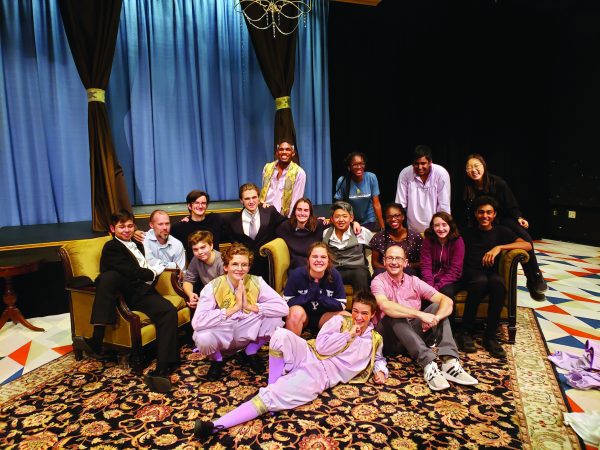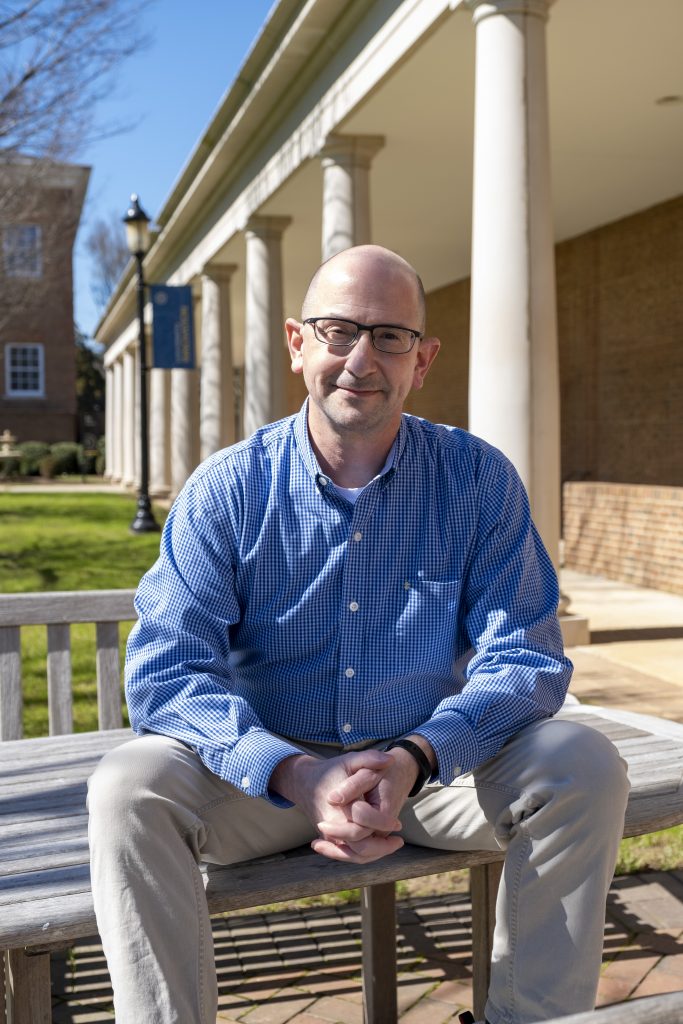Theater teacher Glen Matthews vividly remembers standing transfixed in the quiet dark of backstage Berger Hall. Before him, Evan Zhu ‘23, playing Simba in the 2017 production of The Lion King Junior, was grieving his father Mufasa, newly killed in a wildebeest stampede.
“He was kneeling over his father’s body and saying ‘Dad! Dad! Wake up, wake up!’” recalls Matthews, his voice breaking with emotion at the memory. “We hadn’t seen anything like it in rehearsals—he was truly living that moment, living that grief; he was weeping, fully transformed.”
“To be able to do that as an actor in front of 500 people, regardless of your age—to be that authentic in a moment—that’s difficult stuff. Actors work their whole life to find that, and here was this young person who allowed themself to just shed their skin—it was beautiful and powerful, a privilege to witness.”
For Matthews, such moments are a triumph, not only as testaments to the artistic growth of his student actors, but as a reflection of the success of the entire ensemble that helps usher them to life on the stage, and for the powerful connection that they forge with the audience.
Ensemble ethic
Helping his students bring such visceral experiences to life—and he’s quick to point out that there have been many during his 23-year tenure at CA—is one of the things Matthews loves most about his role.
Matthews joined CA in 1998—before the campus even had a theater space—arriving after a brief detour as a theater teacher with Neal Middle School in Durham, from acting with The Burning Coal Theater company, which had recently located from Manhattan to North Carolina.
He remembers those early days fondly, meeting with Performing Arts Director Michael Hayes on the second floor of the Admin Building as they began to collaboratively explore what a theater program at CA might look like. What would it emphasize and value? What would it ultimately seek to instill in its students?
“A lot of people, when they hear theater, they’re thinking, ‘oh, well, that class is just going to be about acting,’” offers Matthews. “And, yes, actors are important and, yes, you have to have someone to tell the story. Before you can even get to that part, though, you must have a story to tell.”
And Matthews will tell you that the magic of discovering and telling that story is found in the collaboration of the entire group that supports its production—in the cultivation of the ensemble.
“I knew that I wanted the CA theater experience to be broader than just a focus on what it means to be an actor. Early on, we grounded the work in the ensemble ethic—the idea that we are a diverse group of people working together towards a common goal.
“We spend a lot of time at the beginning of any class exploring what that means. What does it mean to be a part of a group that has invested their resources, their time, and their talents into accomplishing a goal? What are my responsibilities to you? What are your responsibilities to me? To each other? And how are we all contributing to the growth and the maintenance of this wonderful, beautiful thing?” explains Matthews.
Once those relationships and boundaries are established—trust earned and developed—the ensemble becomes the foundation upon which everything is scaffolded, from stage makeup application to combat choreograph, scenery design to, of course, acting exercises. In everything, the ensemble, collaboration, and the collective journey are paramount—at times leading to unexpected learning opportunities.
“I have a sense of what’s going to happen each day, but what’s exciting is that even though there’s a plan, it really depends on the energy of the room—what the students bring into the space, where they are at that moment,” explains Matthews. “Meeting them where they are, saying ‘okay, wherever we end up today is where we are supposed to be,’ is important. And determining what we can learn from that together—that’s exciting; it’s powerful.”
Matthews’s students will tell you that it is an empowering approach.
“Mr. Matthews’s ensemble approach helps everyone grow together and feel like they can experiment with different things,” offers alum Evan Snively ’20. “It really frees you to make your own artistic choices.”
Chioma Modilim ’22 agrees. “Mr. Matthews is always encouraging us as students and actors to step outside our comfort zones and to explore our creativity. Whenever I ask him what I should do as the character in a particular moment or scene, he always responds with, ‘just play with it.’ He is great at balancing guiding us with letting us make our own decisions, and that freedom is something that I’ve really come to appreciate.”
Failing boldly
At its heart, the ensemble ethic is about creating a safe space, one in which everyone is valued and empowered to tap into their most imaginative and creative selves, emboldened to take creative risks—the kind that lead to significant growth and learning.
“I spend a lot of time trying to create that safe space for my students. I want them to know that, when they are here, they can shed their skin, they can be vulnerable,” explains Matthews. “I have a sign in my classroom in the Black Box; I put it there for myself, but I share it with my students. It says, ‘risk all, fail boldly.’
“That concept is something that I stumbled upon years ago while working with adult performers. We all need to be reminded that it is okay to fail boldly. That’s when we learn. That’s when we grow as artists, certainly—but even more importantly—that is when we grow as human beings.”
Matthews, whose roots in performing arts run deep, has been taking creative risks his whole life. From an early age, music and performance were important in his life, whether singing solos in his southern Mississippi church choir as a young child or playing piano in elementary school or the trombone in his high school marching band.
He credits his sixth-grade music teacher for helping him discover a passion and talent for theater. “Mrs. Pugh recognized something in me,” he reflects. She began to take him to see musicals produced in the broader area, ultimately escorting him to his first audition—a civic production of The Wizard of Oz. He would land the part of a munchkin—a small role that would have a big life-long impact, setting a creative trajectory towards a career in theater.
A creative coincidence, his early start got a little boost from contemporary pop culture—thanks to the meteoric rise of the wildly popular musical Annie. “Everything was about Annie, and the sun will come out tomorrow! I had the album, and I was, you know, I was convinced that I was going to be the next Annie,” he laughs. “Obviously, I wasn’t, but it was certainly a driving force.”
His newly discovered love of musical theater would carry him through numerous workshops and community performances before finally leading to the pursuit, first, of a BFA in musical theater from William Carey College and, later, an MFA in directing from the University of Southern Mississippi. It even led him to his partner of 24 years, Gary Williams, a fellow thespian and theatrical collaborator who has been hugely important in his creative journey.
A creative calling
While Matthews is himself no stranger to the spotlight of center stage, having taken many turns acting with various professional troops, directing and teaching has proven his true calling. He credits the pivotal role his own teachers played in sparked his passions, as well as his mother—a kindergarten and daycare provider—as inspiring his love and reverence for the classroom.
“After undergraduate and graduate school, I had a lot of friends who asked, ‘why aren’t you going to New York? Why aren’t you going to LA?” explains Matthews. “Truthfully, I just never felt like that was my calling.
“Teachers had always guided my path; my mom was involved in education, so teaching always resonated with me. And I think directing, which has always been a passion and what I pursued in my own education, has a lot of overlap with teaching. It requires a lot of guiding and supporting—so teaching was a very natural choice, a natural transition.”
At CA, it has proven an incredibly gratifying one, in large part because of the connections he has forged with students and colleagues alike, whether in the classroom, as a student advisor, during an extracurricular production, or leading the Middle School Rollercoaster Madness and Stage Combat Clubs.
Gratifying impact
“One of the wonderful things about teaching in the arts department is that we get introduced to the students in Middle School. We have opportunities to continue to impact their lives and watch them grow and learn from them as they move all the way through 12th grade. That’s something that I don’t think I would have the opportunity to do anywhere else. To be able to be a part of a student’s growth and journey over seven years—it is amazing.”
That appreciation runs both ways.

“It’s difficult to put into words the impact that Mr. Matthews has had on both my time at CA and my life,” reflects alum Kevin Pendergast ’14. “He has been a driving force in shaping my approach to theater, my views of the world, and largely the person I am today.
“Mr. Matthews taught me that theater forces us to embark on work that is often emotionally and mentally taxing. He taught me that to give justice to this work we must ‘spit’ away the baggage of the outside world before we even enter the room. He teaches us to dig within ourselves for answers and work together in the trusting environment he provides to share our findings with an audience. By gathering together and taking a collective breath, Mr. Matthews facilitates insurmountable levels of individual and community growth. He is a driving force in the ensemble of our world.”
Communal catharsis
In April, Matthews and a group of Upper School students, many of whom he has been working with for years, will bring a new production, The Theory of Relativity, to the CA stage. It will mark Matthews’s 28th performance at CA.
Mounting such a production amid a pandemic has not been without challenge, but it is an undertaking that Matthews and his students feel is more important than ever.
“Theater is important. We all have stories to tell, and we all appreciate hearing each other’s stories. I think now, in particular, we need communal experiences—opportunities to celebrate, to mourn, to give honor, to connect and build empathy, to heal.”
Ever the teacher, Matthews offers a history lesson to make his point, sharing how the ancient Greeks were early proponents of the cathartic power of theater.
“The Greeks believed, in coming together to experience the plight of mythic characters suffering through significant tragedy, that they themselves would feel and be purged,” explains Matthews.“I believe that is why theater still exists today. In coming together to live a story all at the same time—we feel, we purge. Hopefully, we walk out those doors better people as a result.”
It is a lofty goal, to be sure, and one that he teaches his students carries significant responsibility rooted in our connection to each other.
“As theater artists, not only do we have the opportunity to help people feel, but in doing so, we can inspire change,” offers Matthews. “I have the privilege of seeing our students do this all the time, through the stories that they tell and how they choose to tell them, together, in the ensemble.”
He pauses, “If a student only remembers one thing from their time with me, I hope it is the importance of the ensemble—that we are stronger and more powerful when we choose to combine our abilities with those of others, to learn from the people around us. Working together as artists, our impact—their impact—is significant. It matters.”

